This blog was published by Sylvia Kalemera, Patricia Onyango, Enid Katungi, Boaz Waswa, Eliud Birachi, Noel Templer, Fadhili Kasubiri, Kessy Radegunda, Elvira Omondi, Eward Mushi and Jean Claude Rubyogo
When COVID-19 hit globally, travel restrictions curtailed the physical interactions that were the main mode of information and knowledge sharing and joint planning with partners in the agriculture sector. Despite this disruption, an opportunity for a wide use of alternative digital technology tools to share agricultural extension information and link producers to seed and grain markets presented itself.
We gather lessons on how the deployment of some digital tools across bean growing countries where Pan Africa Bean Research Alliance (PABRA) works with various bean value chain partners has aided interactions in mitigating the COVID-19 crisis.
Turning to virtual communication to enhance linkages
Before the pandemic hit, PABRA has been championing the use of digital platforms to reach out to bean value chain actors effectively. When the COVID 19 hit in March, this was an even better opportunity to leverage on widespread digital utilization to share bean related research and development information from production, distribution, marketing and consumption. These pockets of information focus on bean production advisories, climate information, and linking farmers to seed and grain markets. Digital platforms such as webinars, virtual training manuals/videos, social media, direct mobile phone calls, data collection tools, and other internet-based communication systems have come in handy especially during these times. The PABRA was connected with partners and informed about various bean value chain activities.
Below are some examples of how PABRA has strongly utilized the digital platforms to enhance communication with partners in the field and in various countries — Burundi, Democratic Republic of Congo, Kenya, and Tanzania.
Virtual data collection with field partners
a. Real-time demonstration plot activity update
On a normal day, researchers visit seed farms and demonstration plots to monitor progress and advise farmers/producers where necessary. With the looming COVID-19, one on one extension services and farmer learning has not been possible. This propelled partners to adopt virtual connection through webinars to engage with partners and conduct various online interactions. Additionally, WhatsApp groups have proven extremely useful in such interactions, where seed and grain producers (farmers, agro-dealers, and seed companies) share photos of their farms with the researchers and other bean value chain actors. These photos revealed ongoing demonstration plot activities in various countries. Countries such as Burundi, Democratic Republic of Congo (DRC), and Tanzania had few restrictions and most field activities like bean demo plot visits and Participatory Variety Selection (PVS) went on with adherence to government measures put in place. Photos below show how partners shared their progress on said the platforms.
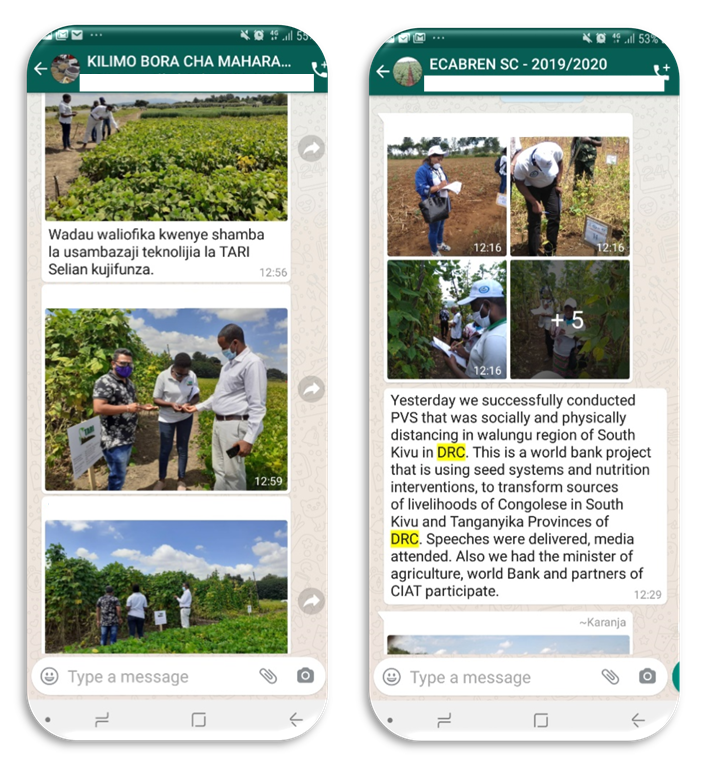
Figure 1: (Left); Kilimo Bora Cha Maharage – a multi-stakeholder WhatsApp Platform in Tanzania used to share field visit experiences; (Right): Members of the ECABREN SC – a platform of East and Central Africa Bean Research Network sharing the countries update from DRC –East.
b. Seed production update
Seed production and demonstration plot data were captured from the field using digital tools like Ona/Open Data Kit (ODK) and were shared directly with the online server (see photos below). This made the data collection and sharing an efficient process. Although the digital data collection initiatives have been in place, its versatility and use have been experienced more explicitly during this time.
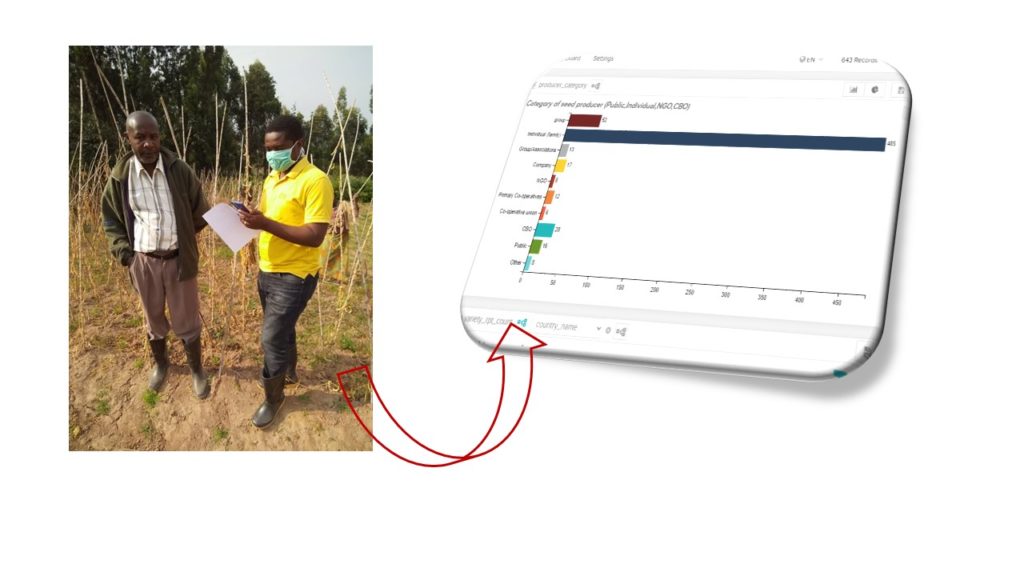
Figure 2: (Left); Burundi Bean Research Officer (Blaise), using Ona data collection tool installed on mobile phone to capture and share seed production data from one of the producer. (Right); The server interface showing how the submitted data from various seed producers is being viewed
Digital extension services to farmers and other complementary technologies
a. Seed accessibility
Food and nutrition security during this pandemic is of utmost concern in most countries. Thus, most African governments regard agriculture as an essential service and most on-farm activities are ongoing with measures in place. When COVID- 19 hit in March, most of the countries in Eastern Africa were planning to start the season and consequently the pandemic posed a challenge on seed access by farmers. The WhatsApp platform formed earlier comprising of researchers, bean seed multipliers, agro-input suppliers, farmers, facilitators, and mechanization service providers were now used to link farmers to various services related to seed sources, agro-input suppliers and mechanization service providers.
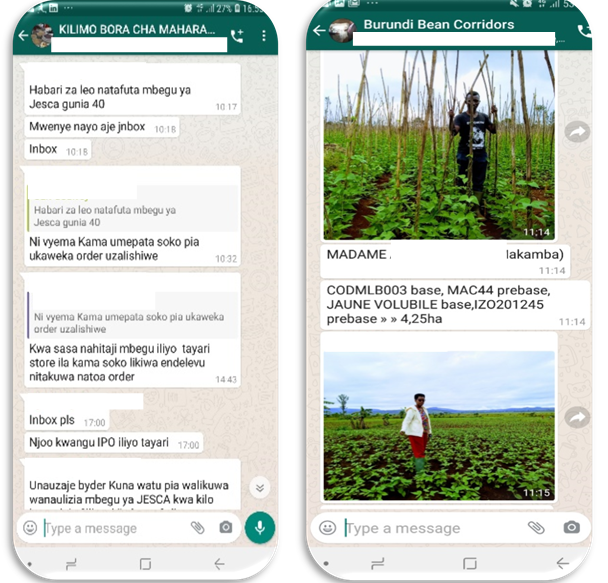
Figure 3: (Left); Partner engagement showing the linkage between a farmer and seed producer through WhatsApp platform in Tanzania. (Right); Seed producers in Burundi sharing an update of their bean seed farms
b. Disease diagnostics and recommendations
Despite the social distancing regulations in place, researchers were a-WhatsApp-message-away to provide the needed technical support and advice to the bean seed producers. The WhatsApp groups have played a significant role in connecting the research agronomists and the farmers. Disease concerns raised by farmers on these platforms were identified and suitable management measures were suggested as indicated in below chats.
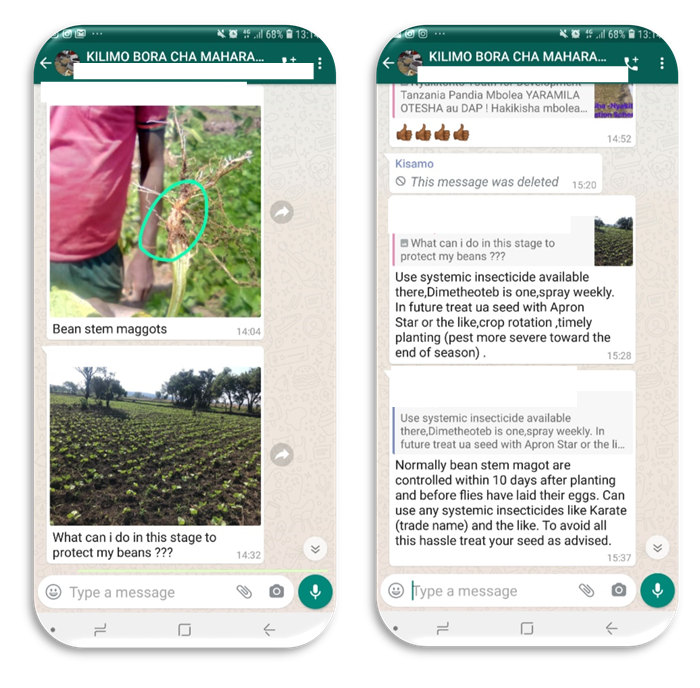
Figure 4: WhatsApp interaction between a seed producer and researchers. A farmer was seeking support on disease diagnostic support (Left) and recommendations from the researchers in Tanzania (Right)
c. Access to mechanization services
In Burundi and Tanzania, the WhatsApp platforms comprising 110 and 167 group members respectively, allowed artisans fabricating multi-crop threshers (can thresh up to eight crops including beans) to promote their machines to farmers. Some of the WhatsApp updates from the field as shared by local artisans about the technology development and service provision to farmers are shown below.
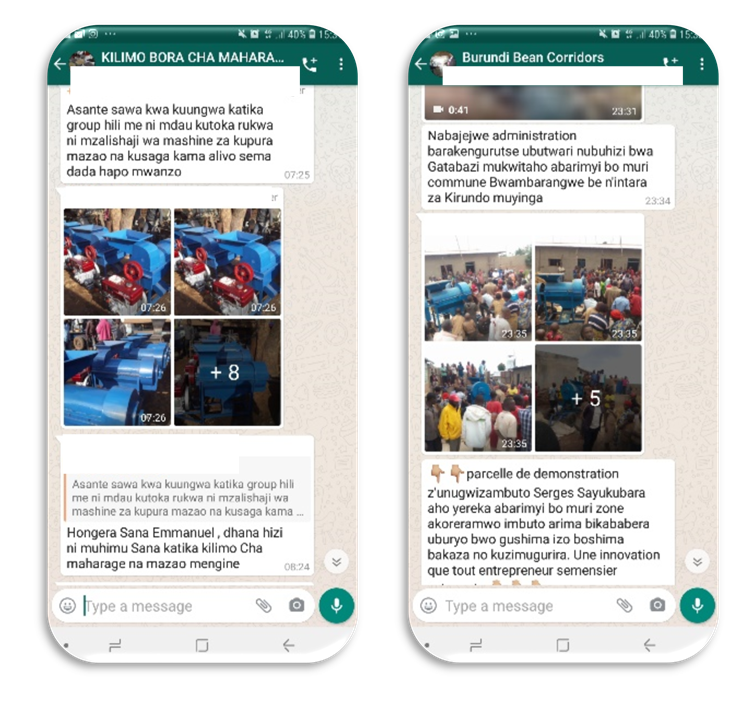
Figure 5: Above: Discussions on WhatsApp platforms form Tanzania and Burundi about the Multi Crop Threshers (MCTs) services and their efficiency as shared by local artisans and researchers.
Capacity building to public and private actors through digital platforms
Capacity building to the National Agricultural Research Systems (NARS)
a. Training meetings on digital seed road map generation and demonstration plot data collection tools have been conducted in collaboration with the International Crops Research Institute for the Semi-Arid Tropics (ICRISAT) in collaboration with PABRA and partners. PABRA coordinated and linked five research stations focusing on beans in Ethiopia, Tanzania, and Uganda. The display of tools was via webinars while tool installation was on a one-to-one basis between PABRA staff and NARS through WhatsApp. The training has helped the NARS simplify work when it comes to seed road map planning and generation. Capturing and sharing demo plots information has been simplified.
Building capacity of farmers to use digital payment solutions.
Through the Bean Corridor Approach, PABRA has facilitated the process of linking farmers to grain traders using Information and Communications Technology (ICT) in Tanzania and Uganda. Digital communication platforms have once again played a major role in capacity building and linkages between the Agricultural Marketing Cooperative Societies (AMCOS) with bean grain traders through the MasterCard Farmer Network (MFN) digital platform. Unlike Uganda, Tanzania had no strict lockdown; however, organization policy did not allow staff to travel. While expanding the inclusive benefits of using MasterCard Farmer Network (MFN) including digital payment (https://www.pabra-africa.org/farmer-network-application-delivers-financial-inclusion-for-tanzania-farmers-case-of-kaderess-working-in-partnership/) in partnership with KADERES the PABRA staffs remotely trained the new cooperative chairpersons to use the android mobile phone obtained jointly for registering farmers in their platforms. The support was provided through direct phone calls and WhatsApp group discussions (see photos below).
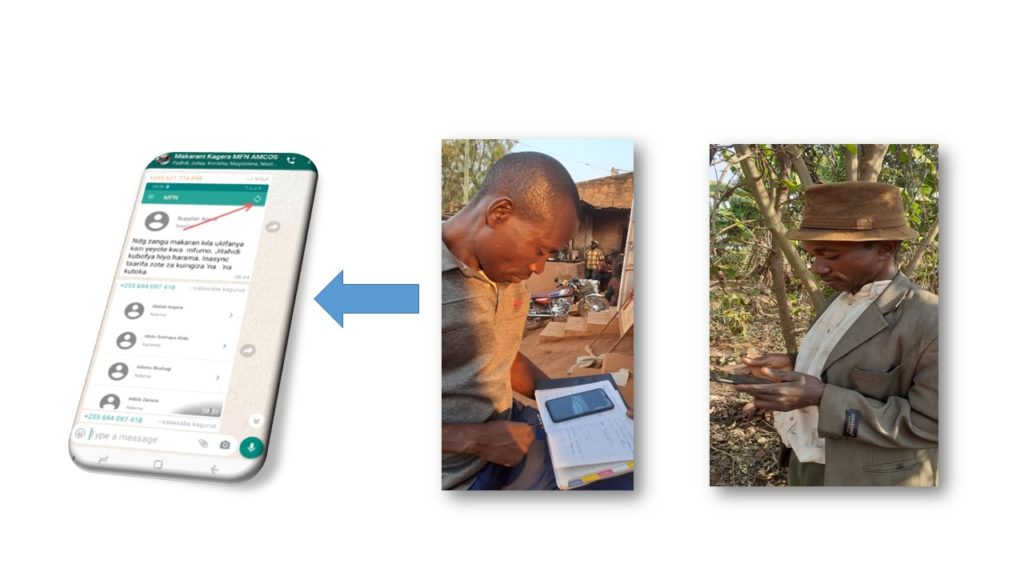
Figure 6: (Left); WhatsApp communications between trainers and AMCOS Chairpersons. (Right); are some of the Chairperson uploading grain produce data on MFN systems from Kagera, Tanzania
The qualified agents, registered farmers who brought in their bean produce into the MasterCard Farmer Network (MFN) digital platforms. Cash was sent digitally through mobile money and directly to each farmer who was registered and submitted their bean produce via mobile phones. Since March this year, a total of 21 AMCOS agents and 11 chairpersons have been recruited and trained virtually on the use of the MFN platform, also 584 new farmers have been registered. By June 2020, a total of 240,513 farmers had been registered and a total amount of US$ 2.129 million transacted on the platform. This success in the use of digital platforms to bring together smallholder farmers and traders in one space and to exploit digital financial inclusion in conducting business with limited physical contact.

Figure 7: (Left); The mobile interface of the MFN, this is a real-time platform viewed by AMCOS chairpersons when agents register farmer harvest on the platform. (Right); Graphs in brief report on transactions as viewed by the admin from the webserver.
Meetings with key stakeholders in the bean value chain
Meeting with Non-Governmental Organizations working on beans through the digital platform
In Tanzania, four meetings involving four development partners engaged in bean seed promotion and dissemination were conducted. The meetings aimed at strengthening relationships with the Tanzania Agriculture Research Institute (TARI) and PABRA, understanding partners’ needs, challenges, and exploring mutual gains. Through these meetings, business linkages have been established between development partners and private sectors on seed and grain trading especially at this time of business uncertainty.
Meeting with Private Sector to Strengthen Partnership across Africa through a digital platform
At the beginning of July, a webinar meeting on ‘‘Strengthening Private Partnership to boast bean business in Africa’’ was convened by PABRA. Thirty-nine participants drawn from Eastern and Southern Africa were in attendance, bringing private sectors from the agro-inputs, seed producers, grain processors, grain traders, mechanization, and National Agriculture Research Systems (NARS). The purpose was to strengthen the relationship between research, the private sector, and development partners. Field experiences on agro-input business linked to beans (Kenya), farmer information services (Malawi), mechanization services (Tanzania) grain trader (Zambia/Malawi), and how it influences bean seed demand in respective regions. PABRA team reminded the private sectors on different technical support areas available to tap into should need to arise.
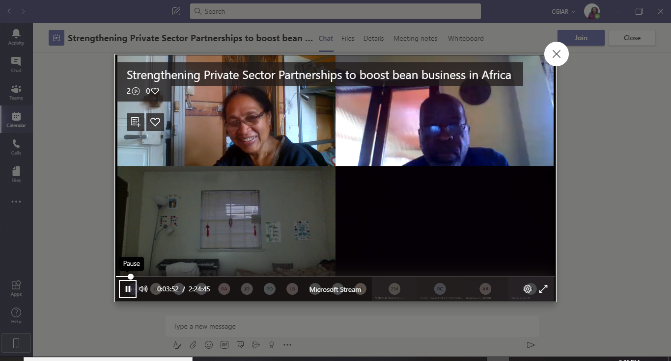
Figure 8: Some of the participants logged into the webinar session with various partners from the private sector.
Conclusion
With the pandemic still here, PABRA has developed client-oriented e-resource manuals/tools for both training and information sharing which are useful in connecting with the network members including smallholder farmers and their organizations. PABRA will also continue facilitating and catalyzing digital business to business interactions targeting small and medium enterprises and peer mentoring targeting women and youth.
